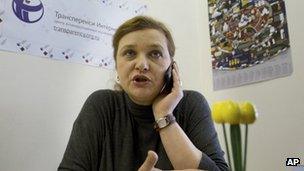Russia NGOs decry 'intimidation' raids
- Published

Transparency International's Yelena Panfilova says her office has been inspected twice in recent weeks
Russian officials speak of "unplanned inspections" - but human rights advocates call the recent raids on dozens of NGOs a campaign of intimidation.
The authorities say they want to check whether the organisations are operating legally - particularly whether they comply with a controversial law requiring all NGOs receiving overseas funding to register as "foreign agents".
But human rights watchdog Agora says at least 90 NGOs have used its hotline since last week to complain about visits by officials from the prosecutor-general's office, the justice ministry and the tax authorities.
Foreign NGOs - such as Amnesty International, Human Rights Watch and Transparency International - have been among those targeted.
'Unacceptable label'
Marina Gridneva, from the prosecutor-general's office, said the checks were being conducted "in strict compliance with the current legislation".
Russian officials typically arrive unannounced, or at short notice, and request groups to hand over legal and financial documents, eyewitnesses say.
Yelena Panfilova, who heads Transparency International's office in Moscow, said she was surprised that it was being checked again - just a month after a similar inspection.
Law enforcement agents visited her office on Wednesday and gave her 24 hours to hand over paperwork. Ms Panfilova's links the checks with the new NGO legislation.
"We are on the list of NGOs that are visible and presumably receive foreign funding. As far as I understand, there is a big search for 'foreign agents' among the NGOs," she told the BBC.
When the controversial law on NGOs was approved in November, a number of prominent Russian groups said they would not comply - even if that risked closure.
They regard the term "foreign agents" as insulting, saying it harks back to Stalin-era purges.
Memorial, an NGO gathering information about victims of Communism, reiterated this position earlier this week when law enforcement agents turned up at its office.
"Memorial… has carried out a research of people who 70 years ago were called agents by the authorities and then shot. For us, taking on the label of a foreign agent is unacceptable", Memorial's Alexander Cherkasov told Reuters news agency.
Vague definition
The "foreign agent" bill was one of several controversial laws adopted in the aftermath of last year's pro-democracy protests in Moscow.
Other measures introduced tougher internet restrictions, outlawed "gay propaganda" and banned adoptions of Russian orphans by US parents.
"The scale of these inspections serves to reinforce the menacing atmosphere for civil society created by the adoption of last year's laws," Human Rights Watch's Rachel Denber told Reuters.
The group's Moscow bureau was inspected last Thursday.
Several NGOs, including Transparency International, reported that the visiting officials were also looking into the organisations' compliance with anti-extremist legislation.
Russia's law gives an extremely vague definition of extremism, allowing officials much leeway in choosing their targets.
- Published22 March 2013
- Published21 July 2012